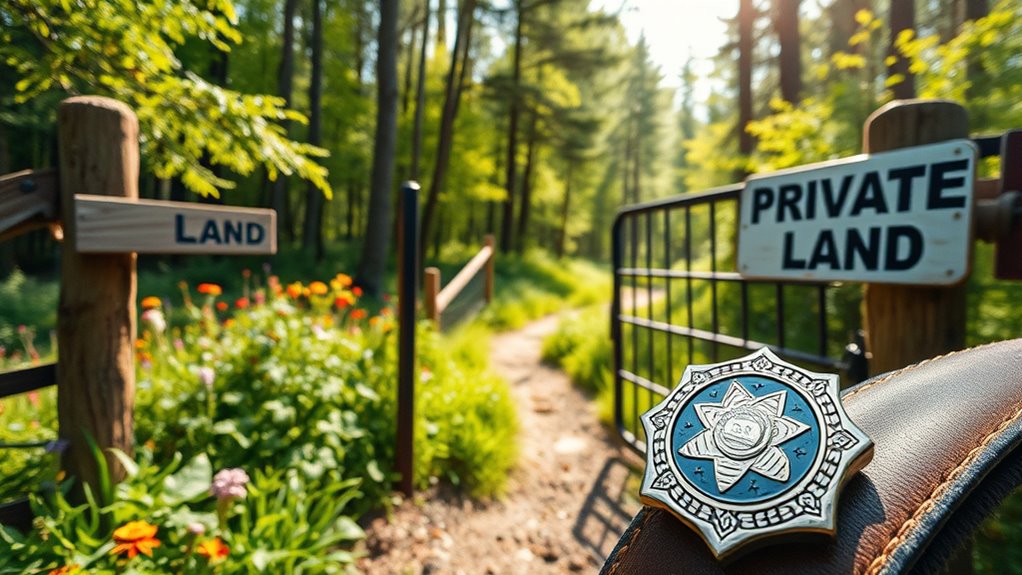When accessing private land, you must respect property owners’ rights by avoiding unauthorized entry and following posted signs. Always check if permits are required for activities like hunting, camping, or construction to stay within legal boundaries. Ignoring these rules can lead to fines or legal trouble. Being aware of local regulations and land etiquette helps prevent conflicts and shows respect for landowners. Keep exploring to learn more about managing legal access responsibly.
Key Takeaways
- Always obtain necessary permits before accessing private land or restricted areas.
- Respect property boundaries and landowner rights to avoid trespassing and legal penalties.
- Follow posted signs and restrictions to ensure lawful and safe access.
- Be aware of cruise port regulations and local rules to prevent unintentional violations.
- Do not use trademarks or logos without permission to avoid intellectual property infringement.

Have you ever wondered what fundamental legal principles shape our everyday lives? It’s easy to overlook how laws influence simple activities like crossing a neighbor’s land or using a familiar brand. Understanding these basics helps you respect boundaries and avoid legal trouble. For instance, one key concept is landowner rights, which protect property owners from unauthorized entry and misuse. When you venture onto private land, it’s essential to recognize that landowners have the legal authority to control access. Ignoring their rights can lead to accusations of trespassing, which might result in fines or other legal consequences. Respecting these rights isn’t just about avoiding trouble; it’s about acknowledging the effort and investment landowners put into their property. If you’re unsure whether you have permission to access land, it’s best to ask first and follow any posted signs or restrictions.
In addition to landowner rights, understanding issues around access and permits is indispensable. Many areas, especially parks, construction zones, or private properties, require permits for entry or certain activities. Operating without proper authorization can result in legal penalties, even if your intentions are innocent. Permits serve as a legal framework ensuring that activities are conducted safely and within designated boundaries. Always check local regulations before entering a property or engaging in activities like hunting, camping, or filming. Being proactive by obtaining necessary permits not only keeps you within the law but also shows respect for the landowner’s authority and the community’s rules. Furthermore, awareness of cruise port regulations can help travelers avoid unintentional violations during their trips, ensuring a smooth experience.
Another aspect to consider is avoiding trademark infringement, which is a different but equally important legal concern. If you’re involved in creating products or advertising, using a trademarked logo or name without permission can lead to serious legal trouble. Trademark infringement can cause confusion among consumers and harm the brand’s reputation. To steer clear of this, always verify that you have the rights to use a trademarked name or symbol before incorporating it into your work. Respect for intellectual property rights is just as imperative as respecting physical boundaries. Both protect individuals and businesses from unfair competition and misuse.
Frequently Asked Questions
How Do I Find Out Who Owns a Piece of Private Land?
To find out who owns a piece of private land, you can check the land registry or property records for your area. Visit the local government or land registry office’s website, or contact them directly. These records usually list the owner’s name and contact information. You might also use online property record databases, but official sources tend to be the most accurate and up-to-date.
What Should I Do if I Encounter a “No Trespassing” Sign?
When you see a “no trespassing” sign, pause and assess the situation. Trespassing awareness tells you it’s a warning—respect it. Sign interpretation is clear: entry is forbidden. Ignoring this could lead to legal trouble or confrontation. Instead, turn around and find a legal route or seek permission if you truly need access. Respecting private land preserves good relations and keeps you safe from potential issues.
Are There Any Specific Permits Required for Camping on Private Land?
You need landowner permissions before camping on private land, as permits are often mandated by local camping regulations. Check with the landowner to get explicit approval and understand any specific rules they have. Some areas might have permits or restrictions, so always verify local camping regulations as well. This ensures you stay legal, respectful, and avoid any potential issues during your outdoor adventure.
How Can I Respectfully Ask for Permission to Access Private Property?
Sure, you can channel your inner diplomat by approaching landowners with genuine respect. Start with a friendly face and a smile, then politely ask for permission. Use landowner communication techniques, emphasizing gratitude and understanding. Follow permission etiquette by listening carefully, respecting their rules, and thanking them sincerely. Remember, a little humility and a lot of politeness go a long way—after all, they hold the key to your outdoor adventure.
What Are the Consequences of Ignoring Land Access Regulations?
Ignoring land access regulations can lead to serious legal repercussions, including fines or criminal charges. You might also face landowner retaliation, such as being asked to leave or facing trespassing claims. These actions can damage your reputation and hinder future access. Always respect property rights, seek permission, and follow local laws to avoid these consequences and maintain positive relationships with landowners.
Conclusion
By understanding access rules, securing permits, and respecting private land, you protect your rights, avoid conflicts, and promote responsible outdoor experiences. Respect the land, follow the laws, and practice good etiquette. Be informed, be courteous, and be responsible. When you do, you guarantee that everyone can enjoy nature safely and sustainably. Remember, legal knowledge guides your actions, ethical behavior builds trust, and responsible conduct preserves the land for generations to come.










